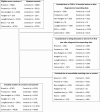Incidence of cardiovascular disease up to 13 year after cancer diagnosis: A matched cohort study among 32 757 cancer survivors
- PMID: 30220107
- PMCID: PMC6198235
- DOI: 10.1002/cam4.1754
Incidence of cardiovascular disease up to 13 year after cancer diagnosis: A matched cohort study among 32 757 cancer survivors
Abstract
We examined the incidence of cardiovascular disease (CVD) among 32 757 cancer survivors and age-, gender-, and geographically matched cancer-free controls during a follow-up period of 1-13 years, and explored whetherCVD incidence differed by received cancer treatment, traditional cardiovascular risk factors, age, or gender. Adult 1-year cancer survivors without a history ofCVD diagnosed with breast (n = 6762), prostate (n = 4504), non-Hodgkin (n = 1553), Hodgkin (n = 173), lung and trachea (n = 2661), basal cell carcinoma (BCC; n = 12 476), and colorectal (n = 4628) cancer during 1999-2011 were selected from the Netherlands Cancer Registry and matched to cancer-free controls without a history ofCVD. Drug dispenses and hospitalizations from thePHARMO Database Network were used as proxy forCVD. Data were analyzed using Cox regression analyses. Prostate (HR: 1.17; 95%CI: 1.01-1.35) and lung and trachea (HR: 1.48; 95%CI: 1.10-1.97) cancer survivors had an increased risk for developingCVD compared to cancer-free controls. This increased risk among lung and trachea cancer survivors remained statistically significant after including traditional cardiovascular risk factors and cancer treatment information (HR: 1.41; 95%CI: 1.06-1.89). Among prostate cancer survivors, the increased risk of incidentCVD was limited to those who received hormones and those without traditional cardiovascular risk factors. Breast, non-Hodgkin,BCC, and colorectal cancer survivors showed no increasedCVD risk compared to cancer-free controls. There was an increased risk of incidentCVD among prostate, and lung and trachea cancer survivors compared to age-, gender- and geographically matched cancer-free controls. Studies including longer follow-up periods are warranted to examine whether cancer survivors are at increased risk of long-term incidentCVD.
Keywords: cancer survivors; cardiotoxic treatment; cardiovascular disease; matched cohort study.
© 2018 The Authors. Cancer Medicine published by John Wiley & Sons Ltd.
Figures

References
-
- Howlader N, Noone AM, Krapcho M, et al. SEER cancer statistics review, 1975‐2009 (Vintage 2009 Populations). Based on November 2011 SEER data submission, posted to the SEER web site. http://seer.cancer.gov/csr/1975_2009_pops09/. Accessed April, 2012.
-
- Aziz NM. Cancer survivorship research: state of knowledge, challenges and opportunities. Acta Oncol. 2007;46:417‐432. - PubMed
-
- Brown BW, Brauner C, Minnotte MC. Noncancer deaths in white adult cancer patients. J Natl Cancer Inst. 1993;85:979‐987. - PubMed
-
- Geiger S, Lange V, Suhl P, Heinemann V, Stemmler HJ. Anticancer therapy induced cardiotoxicity: review of the literature. Anticancer Drugs. 2010;21:578‐590. - PubMed
-
- Schimmel KJ, Richel DJ, van den Brink RB, Guchelaar HJ. Cardiotoxicity of cytotoxic drugs. Cancer Treat Rev. 2004;30:181‐191. - PubMed
Publication types
MeSH terms
LinkOut - more resources
Full Text Sources
Other Literature Sources
Medical
Molecular Biology Databases

